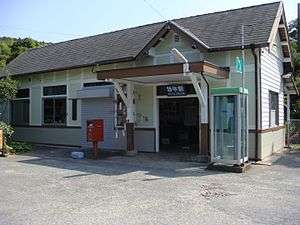Kottoi Station
Kottoi Station (特牛駅, Kottoi-eki) is a JR West railway station located in Shimonoseki city, Yamaguchi Prefecture, Japan. People who disembark at Kottoi Station can take a 20-minute bus ride to Tsunoshima via the Tsunoshima Bridge (角島大橋, Tsunoshima-ōhashi), a 1,780-metre-long (5,840 ft) bridge that joins Tsunoshima to the mainland at Hōhoku Town. It was the longest toll free bridge in Japan when it was completed on November 3, 2000.
Kottoi Station 特牛駅 | |
|---|---|
 Station building | |
| Location | 264-2, Hōhoku-chō Oaza Kanda Aza Obagasako, Shimonoseki, Yamaguchi (山口県下関市豊北町大字神田字大場ヶ迫264-2) Japan |
| Coordinates | 34°18′21″N 130°55′08″E |
| Operated by | JR West |
| Line(s) | San'in Main Line |
| Connections |
|
| History | |
| Opened | 1928 |
| Traffic | |
| Passengers (2010) | 34 daily |
Station layout
Kottoi Station is housed in its original wooden-framed station building. It is a one-track, single platform station. Because of this single line structure, trains bound for Nagatoshi Station as well as Kogushi Station stop at the same platform. Previously the platform had a side track, allowing trains that were traveling in different directions to pass one another, however this was discontinued in 1970. The station is run by the Nagato Railroad Bureau. Though there are no staff members at the station, some tickets can be purchased from a small shop in front of the station. As there is a difference in height of a few meters between the station building and the platform, there is a staircase to the platform which crosses over the old track. There is a waiting room on the platform side of the station building, but there is no door. The station is located considerably higher than the village it serves.
History
- 9 September 1928 - The extension of the Japanese National Rail Kogushi Line, as it was then known, from Takibe Station to Agawa Station, is completed. Services for passenger and freight trains commence.
- 24 February 1933 - The Kogushi Line is incorporated into the San'in Main Line.
- 1 August 1961 - The service of freight trains is cancelled.
- 1 April 1987 - Under the privatisation of Japan's railways, Kottoi Station becomes part of the West Japan Railway Company.
Etymology
The origin of the area name Kottoi has been addressed in various media, particularly as a station name which is difficult to read by Japanese standards. There are two ideas about the origin of the place name. The first comes from the regional way for expressing the word cow (牝牛, meushi) as kottoi. The second comes from an inlet which faces the Sea of Japan known as Kotoe (琴江, kotoe).[1] It is also said to mean "a robust cow that will bear a heavy load".
Platforms
| 1 | ■ San'in Main Line | Agawa, Nagato-Awano, Igami, Nagatoshi Takibe, Nagato-Futami, Kogushi, Shimonoseki |
Lines
The following lines pass through or terminate at Takibe Station:
Adjacent stations
| « | Service | » | ||
|---|---|---|---|---|
| San'in Main Line | ||||
| Agawa | Local | Takibe | ||
| Rapid: Does not stop at this station | ||||
Local area
- Kottoi Fishing Harbour
- Tsunoshima - Before the Tsunoshima Bridge was constructed, the area was home to the Hiju Port (肥中, hijūkō) which connected the island to the mainland. Tsunoshima was also connected via Shimado Port (島戸港, shimadokō) which also had a connecting bus service. Now there is a direct bus to the island.
- Japan National Route 435
Bus line
- Blue Line Bus Service
User statistics
Below are the average number of people who alight at Kottoi Station per day.[2]
- 1999 - 105
- 2000 - 91
- 2001 - 63
- 2002 - 64
- 2003 - 67
- 2004 - 58
- 2005 - 53
- 2006 - 41
- 2007 - 32
- 2008 - 36
- 2009 - 31
- 2010 - 34
References
- 秘境駅に行こう!特牛駅 [Let's Go To Unexplored Stations!Takibe!] (in Japanese). Retrieved 7 August 2012.
- 鉄道乗車人員 駅別 [Railroad Users By Station] (in Japanese). Shimonoseki City Statistics Publications. Archived from the original (XLS) on 5 March 2016. Retrieved 7 August 2012.